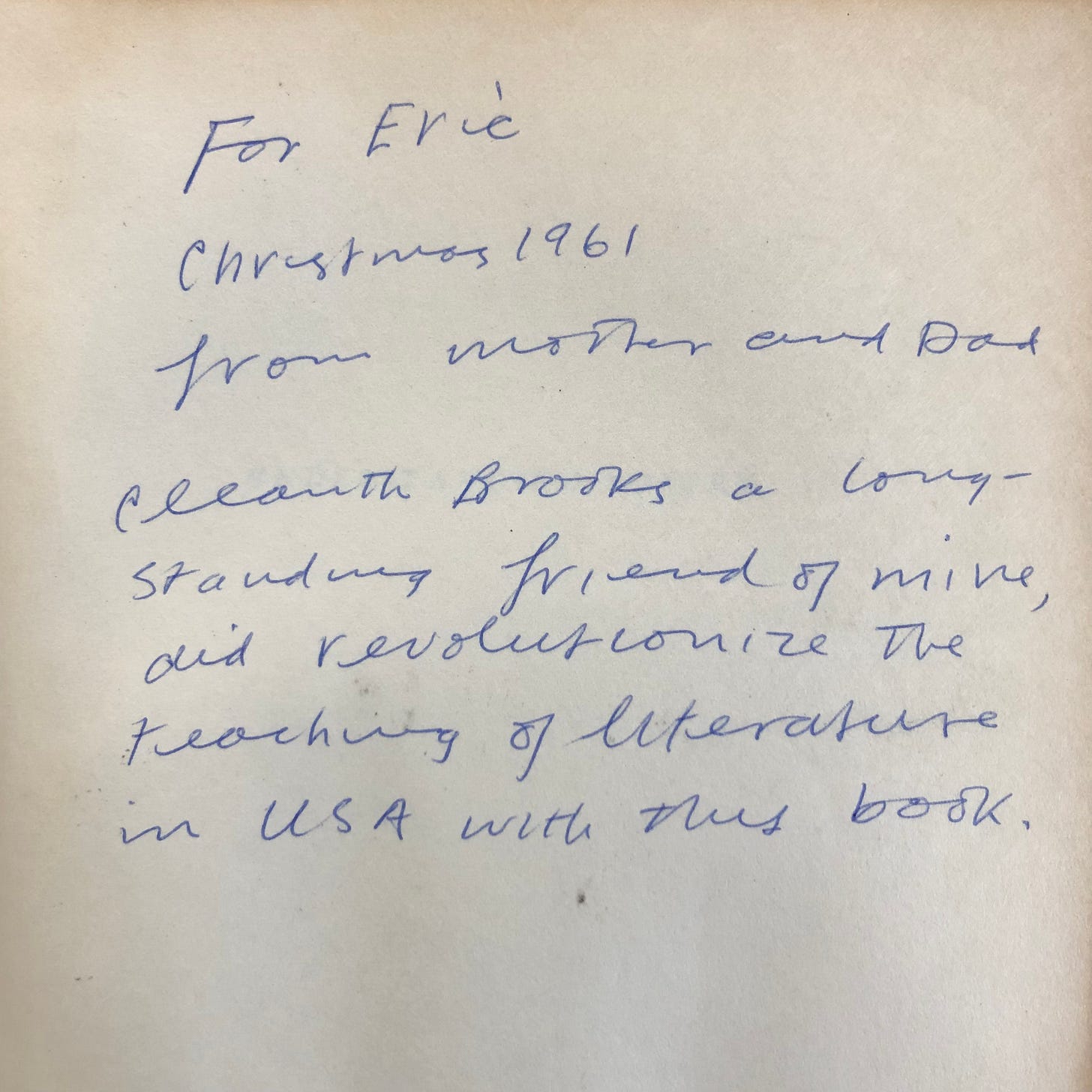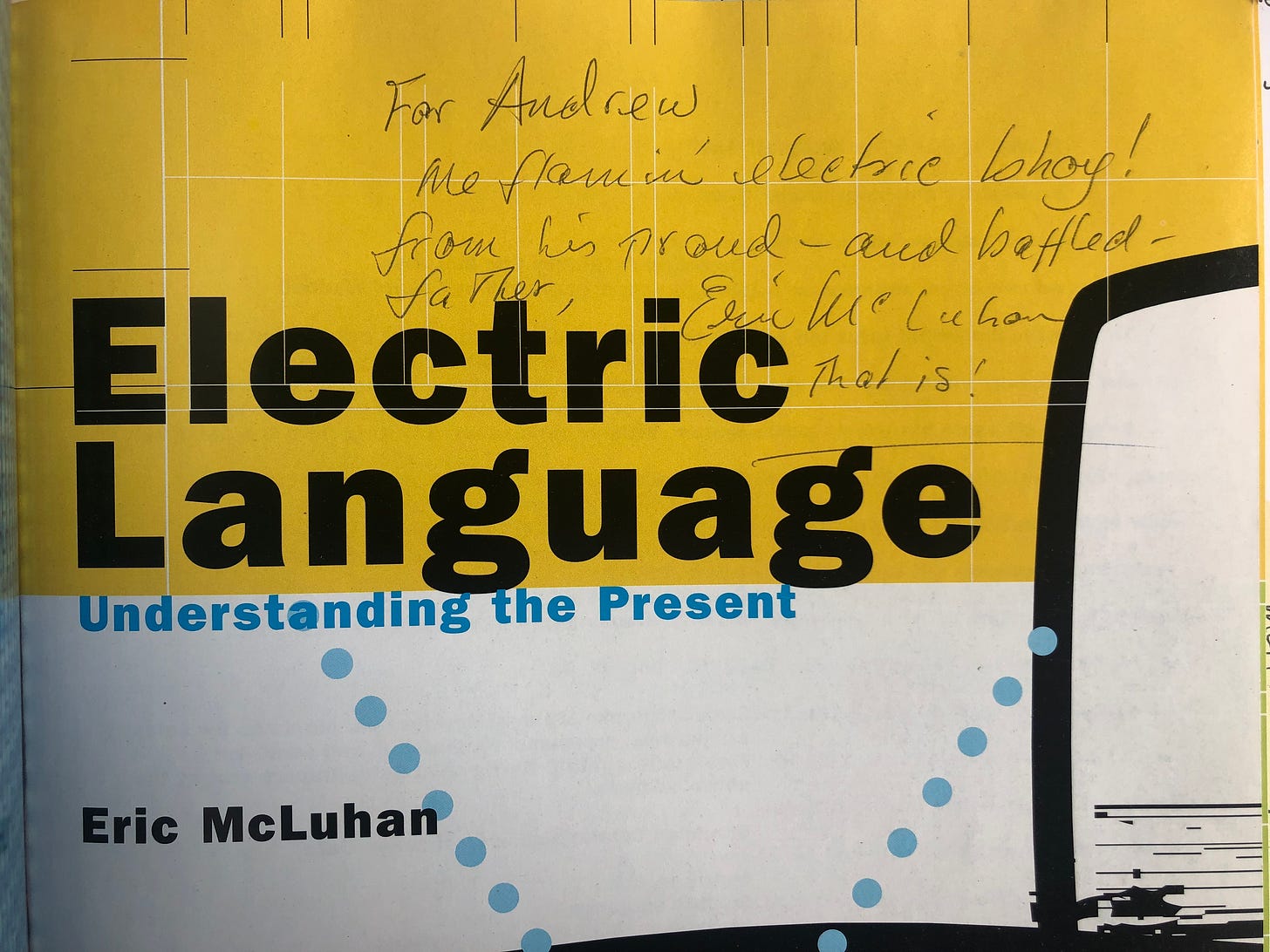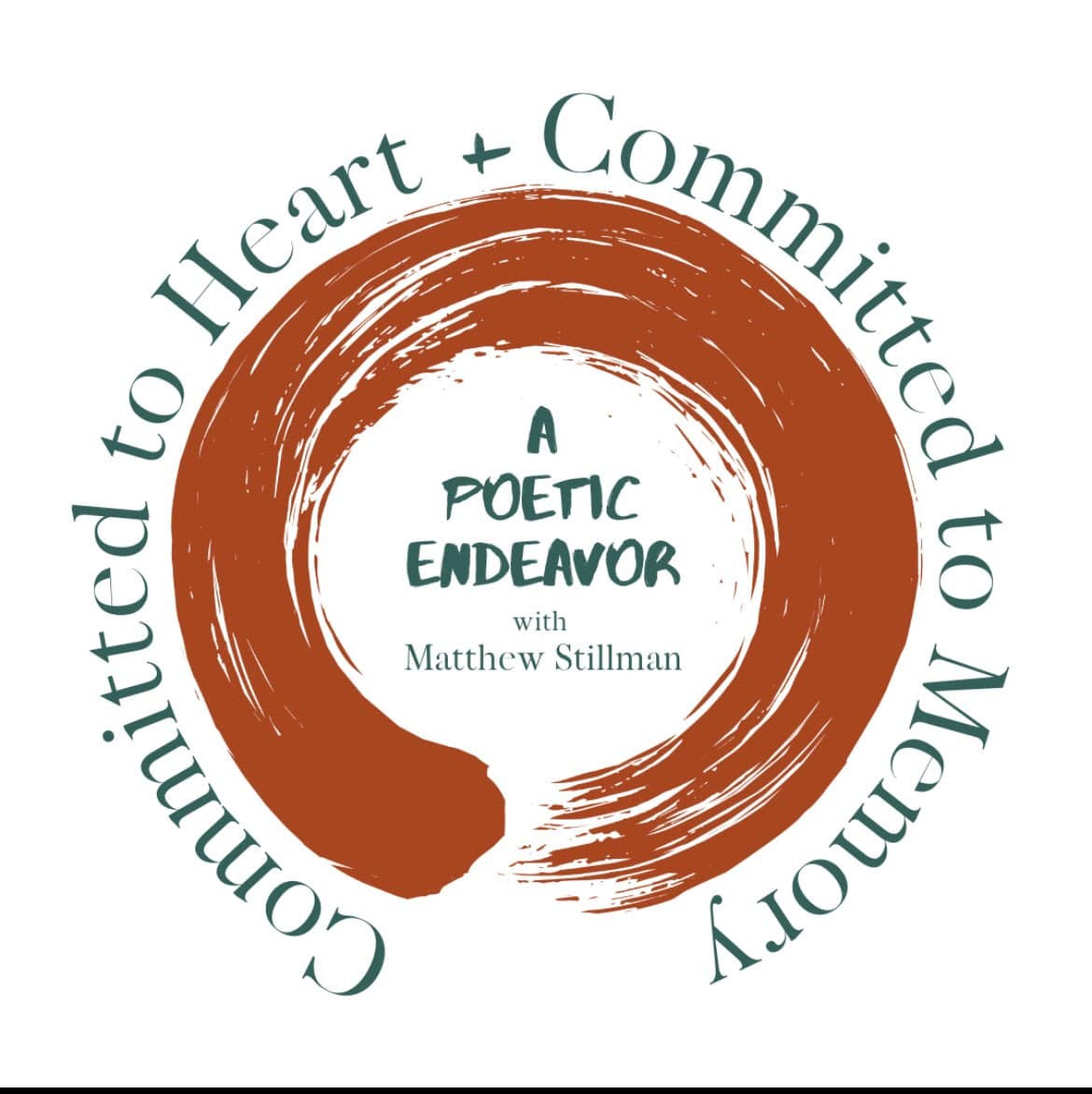Understanding Poetry, Understanding Media.
It is no coincidence that Marshall McLuhan was a lover, expert, and professor of poetry for his entire career. No ‘enemy of the book,’ he was one of its most dedicated users and supporters.
There are few coincidences — perhaps, none. In the vast McLuhan section of my father’s library, McLuhan’s ‘Understanding Media’ rests deliberately beside Brooks and Warren’s ‘Understanding Poetry.’
Eric’s copies bear inscriptions from his father Marshall. In ‘Understanding Poetry’ (Cleanth Brooks and Robert Penn Warren, 1938), Marshall wrote:
For Eric
Christmas 1961
from Mother and Dad
Cleanth Brooks a long-
standing friend of mine,
did revolutionize the
teaching of literature
in USA with this book.
In his copy of ‘Understanding Media,’ Marshall wrote:
For Eric, me
Flaming electric bhoy
This book about the electric age.
Dad May 15/64
(inscribed:
Marshall McLuhan
Finding that inscription shed a bit of light onto the inscription my father made in the copy of his ‘Electric Language: Understanding the Present’ (1998) that he gifted me.
For Andrew
me flamin’ electric bhoy!
from his proud — and baffled —
father,
Eric McLuhan
That is!
Not that it helps me understand it any more clearly, but at least I get the reference.
Both Understanding Poetry and Understanding Media are built from an early work, Practical Criticism: A Study of Literary Judgement’ by I. A. Richards. Richards was one of Marshall McLuhan’s teachers at Cambridge University, which is where he met Cleanth Brooks also.
Both books owe much to Richards and ‘Practical Criticism,’ sometimes also referred to as ‘New Criticism.’ When the experiments behind ‘Practical Criticism’ were fresh, they were scandalous. Essentially, Richards wanted to find out what made ‘good’ poetry ‘good,’ what made ‘bad’ poetry ‘bad.’ Surely there had to be rules of some sort that could be agreed on.
What he did was he took a selection of poems by various poets – some poets were well-known and highly regarded, and he used lesser-known works of theirs to not tip off authorship, and used poems of authors who were not well-regarded, and the poems were distributed to students and grad students and other critics for comment.
The scandal was that no one seemed able to agree on which were any good and why. So the book, and the technique, is largely about how to judge the relative merit of poetry.
I strongly recommend not taking my words for it, and getting a copy for yourshelf.
But another part of the method is getting at not simply the merit or meaning of the work, but the effect of it – and here we see why Marshall became interested.
In a sense, Marshall McLuhan looked beyond the content of media not so much to judge it’s worth, but it’s effect first. How can we judge whether it’s good or bad if we don’t even know what it does (to us). “Diagnosis before prescription,” is how he put it.
To say that what Marshall McLuhan did was take the principles of Practical Criticism and apply them more broadly to technology and culture is more true than it’s not.
I have two main reasons for bringing this up this week. One is that I’m about to re-embark on another voyage of discovery through Understanding Media.
Starting September 12th, in collaboration again with San Francisco’s Gray Area, I’ll be leading a group of like-minded people from around the globe deep into the warren of rabbit holes that is this epic 1964 guide to exploring the ‘personal and social effects’ of technology.
Having now done this twice from cover to cover since 2020, and with around 30 students each time, it’s remarkable to me how fresh this book it – it’s uncanny how relevant each chapter is to understanding today’s technological maelstrom. It’s as if it were deliberately crafted to be a perennial guide to understanding media… (spoiler alert: it was).
I’ve managed to set it up so that the three sections can run back to back to begin in September and finish by the end of June. If that sounds like a lot… it is. It is also one of the most profound experiences of my life, and more than one student (who have ranged from undergrads to professors emeritus to just regular people passionate about the subject) has called “life-changing.”
Read more and register for Understanding Media Intensive part one: Tools for Engagement.
The second reason is that former UMI student Matthew Stillman is offering another round of his journey into poetry and memory and meaning: Committed to Heart, Committed to Memory.
Here is what Matthew says about it:
Travel back in time as we revive an ancient human tradition!
If you have ever admired the lyrical nature of a beautiful speaker or speech, or sat in awe of how a jaw could wrangle words like that, and express the thoughts and feelings of the speaker with such remarking eloquence, you can almost be sure that their tongue was tutored by poetry somehow.
Recitation. Elocution. Oration. These three sisters devotedly cook in the House of Poesy. Ever was it thus.
When words from verse make their way into the heart, the possibility arises to become a more poetic and beautiful speaker. And then when you see or feel a need arise, those words are there at hand - waiting to aid in expressing what is most true - most beautiful - for you.
For fragments of a poem to find their way into your language and the way you speak that poem must be nestled into the bed of your heart and it must be given love and care as it decides to stay a good long while. Those three sisters have deep capacity if they are called upon.
This requires artful practice and attention.
When it comes to beauty making, our minds usually go to our fingers first. Craft. Art. All that is possible because of our ability to articulate with our thumb and fingers. The hand isn’t the only place that we articulate though. It is also tracked in speech. To have beauty available as a habit in our mouths is a skill not generally cultivated. There are ways people are inspired and encouraged to make something creative with their hands; a much rarer skill is to speak and invoke poetry that is appropriate and nourishing in certain moments. A courtship with the tongue. I’d say there is a deep relationship between these two kinds of articulation. In a time bereft of capacity to witness beauty, committing poetry to heart is a way to bring it in. It’s a discipline to have beautiful thoughts circling in your head instead of the more common and often caustic ones.
Together in a small group of up to twelve people, we will memorize three poems in four weeks and then a special addition for the fifth. Work. But absolutely doable work. Matthew will select the poems for length and memorability - not to make it easier, but to make a smoother way forward and to make it possible to recite them together.
In these four weeks, you will learn the principles of how to approach memorizing poetry and how to recite, share, and listen to poetry with each other during the class and during the week you’ll get prompts and encouragement to keep going. How this worthy work will show up in your speech and in your days is veiled to us - for now. It is an experience designed to set the first cobbles into the ground for what can become a lifelong path.
This is not a course in poetry analysis or discussion of meaning, though snippets might show up. The focus is on the skill of oration, elocution, listening, play, aliveness, and sharing.
Over years of trying different methods of memorization, Matthew came across (he didn’t invent it) a method that makes it much easier, applicable to prose and poetry and helps with long and short term memory. He has helped people who didn’t know if they could do it or if poetry mattered to them to find their way with this.
In the last [fifth] session, Andrew and Matthew will have a conversation and discussion about memorization, the significance of poetry as a form in the distant past, its place and use today and wondering how approaching poetry now might tune our senses to the effects rippling through the environment.
Wednesdays at 7pm eastern
September 6, 13, 20, 27th and October 4.
$425
email Matthew Stillman at mstillman@gmail.com to register, secure your spot and set up payment.
That’s all for now. It’s been a busy summer. The condensed version of the Understanding Media course is underway and both fun and fuitful. The full version set to begin next month.
I hope you’ll join us on one of these adventures exploring media and their effects.









Marshall was I A Richard’s best student!